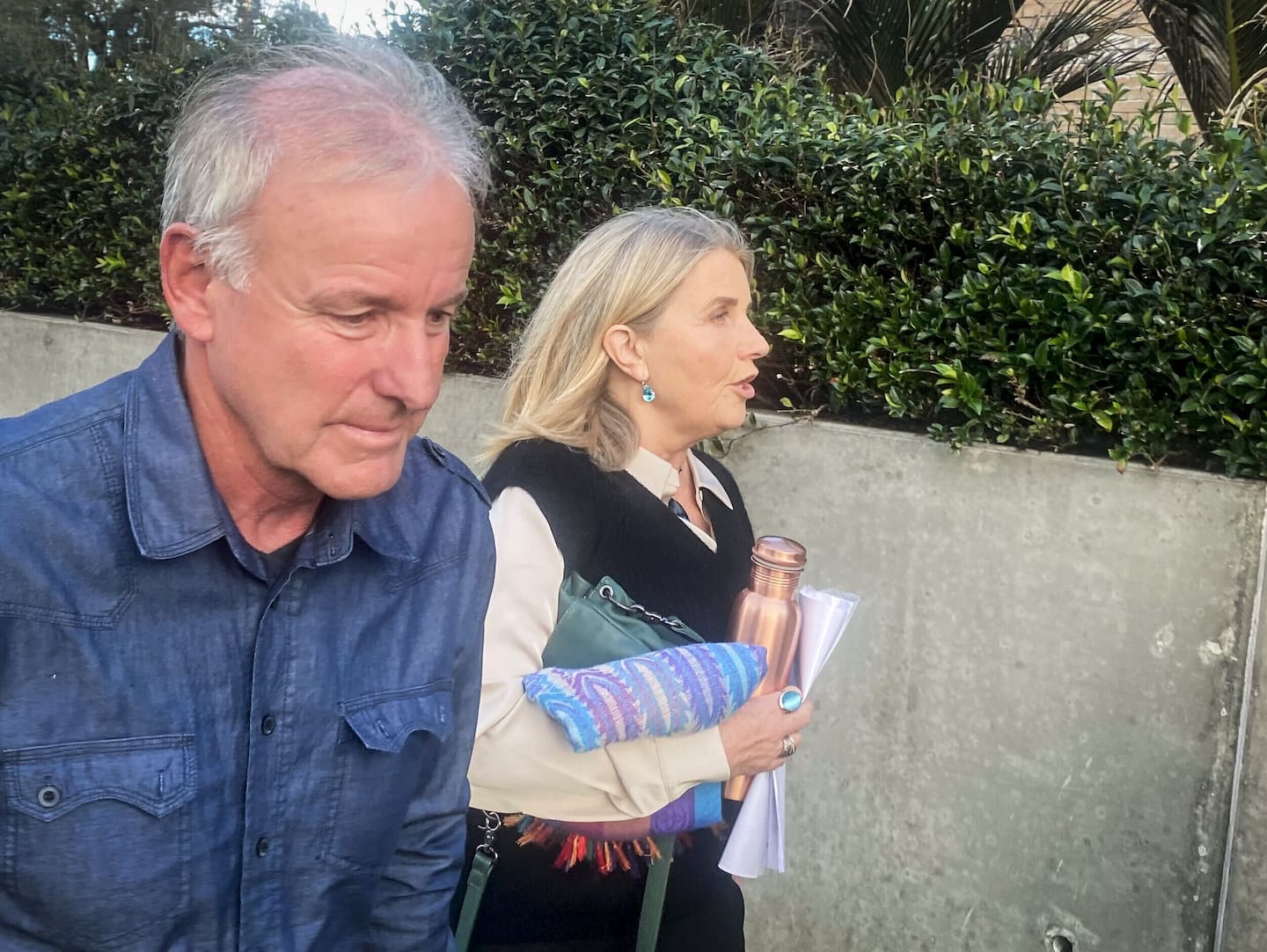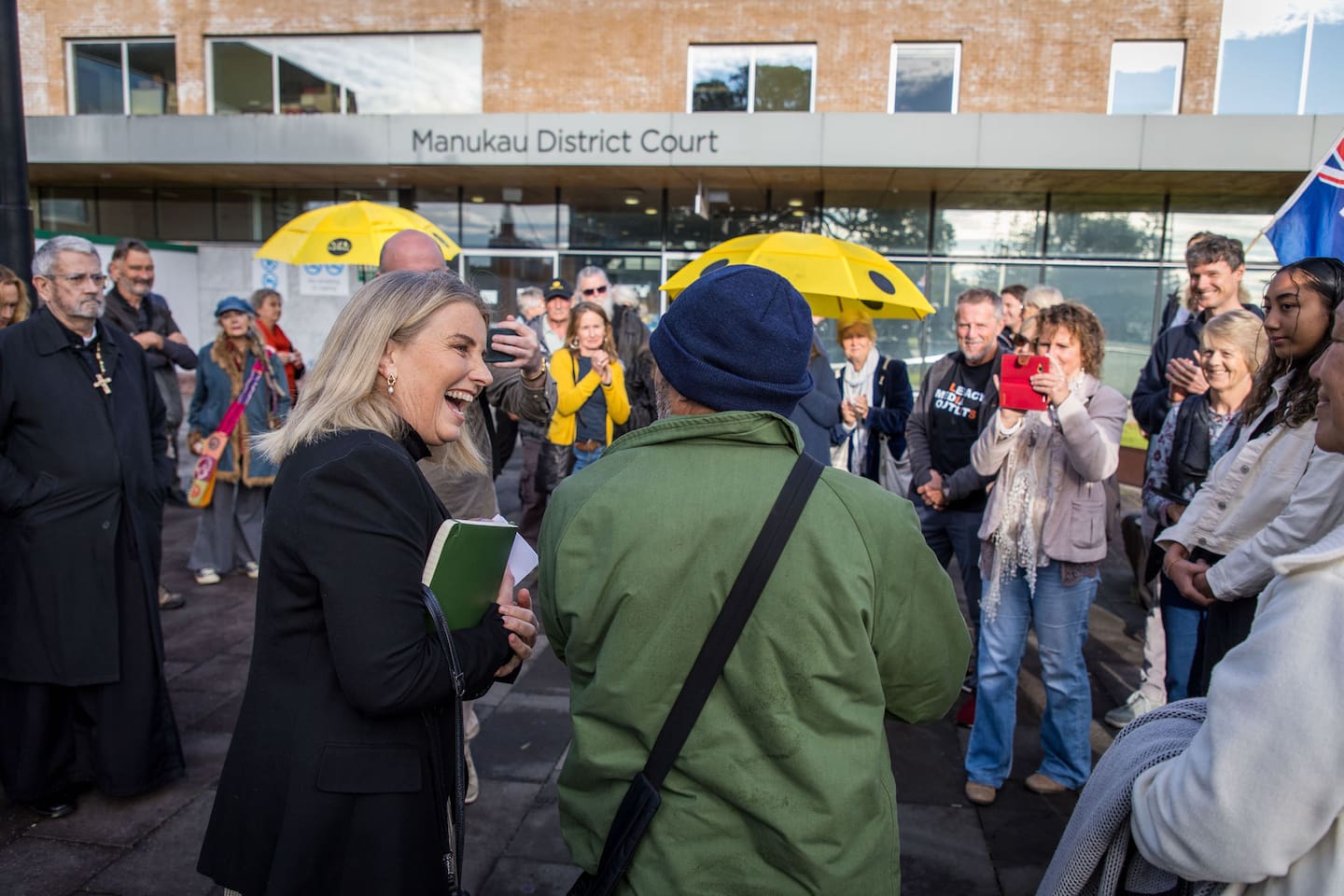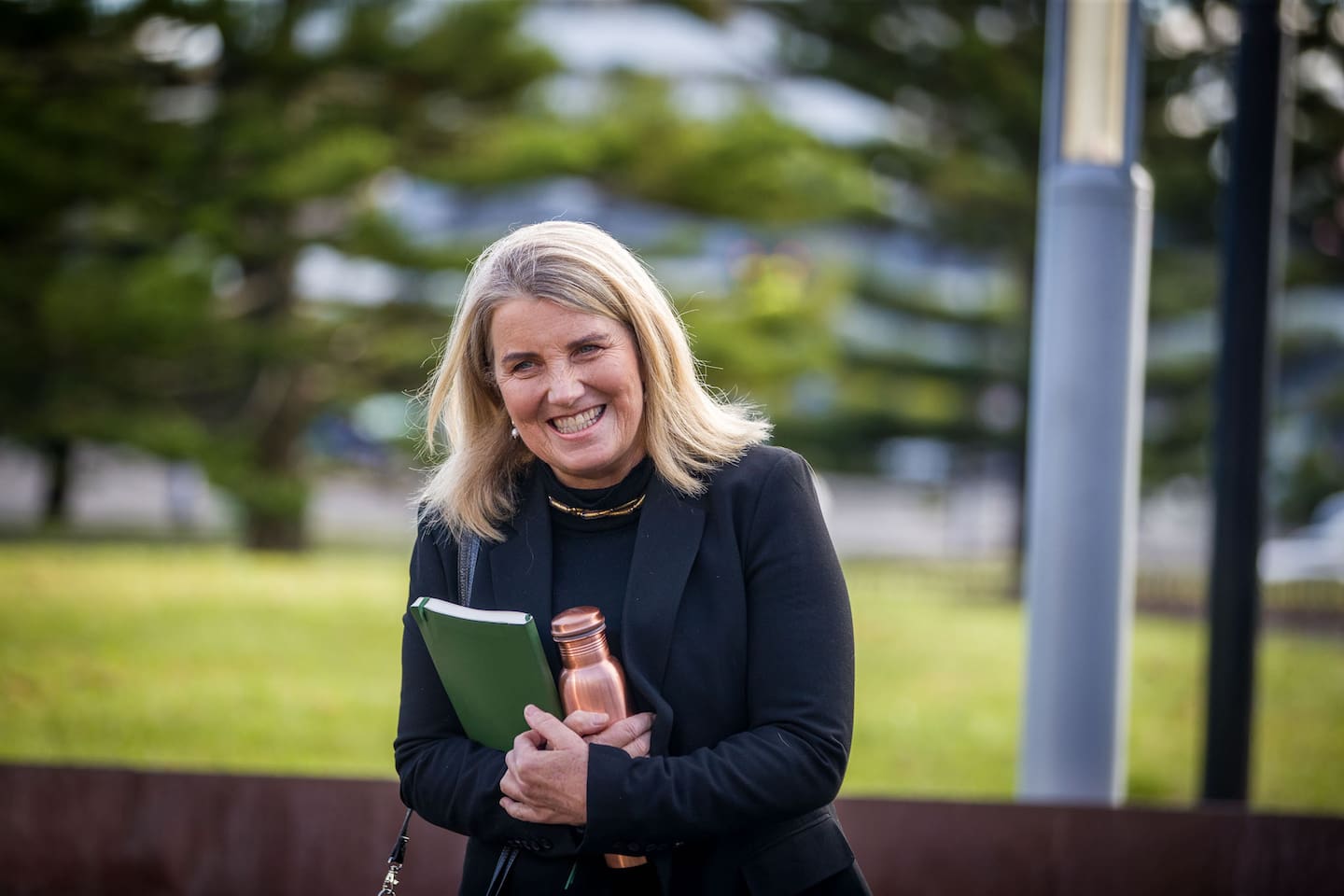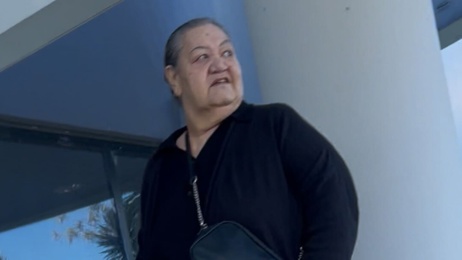Video footage has emerged of anti-vaccination campaigner Liz Gunn’s dramatic arrest at the Auckland International Airport last year.
It comes after a Judge yesterday found Gunn guilty of assault following an eventful trial of the former TVNZ host.
Gunn and her cameraman Jonathan Clark were at the international arrivals terminal on February 25 last year to film the arrival of a family who had been kept in lockdown in Tokelau after refusing the Covid-19 vaccine.
Footage shows the moment two police officers approach the pair and proceed to arrest them in the middle of the busy terminal.
One of the officers appears to attempt a headlock on Gunn before she falls on the ground, while the other officer is seen taking Clark to the ground before handcuffing him. The pair are then led away by the two officers.
Judge Haney Forrest yesterday found Gunn and Clark not guilty of resisting police.
Liz Gunn found guilty of assault
A packed public gallery of supporters at the Manukau District Court applauded when the not guilty verdicts were read on Tuesday.
They expressed dismay when the guilty verdict was returned, yelling “shame” and “disgusting” as the Judge retired.
Gunn and her lawyer Matthew Hague had claimed she had merely touched the arm of the security worker to gain her attention, a defence rejected by Judge Forrest.
In a written judgment released after the hearing, Judge Forrest described it as a “hostile act”.
- Liz Gunn assault trial: Judge finds anti-vaccination campaigner guilty of assault
- Liz Gunn defends calling worker a Nazi amid warning from judge
- Liz Gunn trial: Airport security worker describes alleged assault
“In summary, Ms Gunn was arrogant, rude, overbearing and offensive in her manner in dealing with the complainant,” the judgment said.
Judge Forrest rejected Hague’s defence that Gunn had implied consent to touch Auckland Airport security worker Anna Kolodeznaya on the arm.
 Liz Gunn leaving the Manukau District Court after being found guilty of assault. Photo / George Block
Liz Gunn leaving the Manukau District Court after being found guilty of assault. Photo / George Block
“To the contrary, she acted with complete and total disregard for social norms and for Ms Kolodeznaya.”
Hague indicated he intended to seek a discharge without conviction at sentencing. Common assault in the Summary Offences Act carries a maximum term of imprisonment of six months or a fine of up to $4000.
Gunn declined to comment to media outside court. Clark described the verdict as “deeply unjust”.
He reiterated the defence position that Gunn had merely tapped the Auckland Airport security worker on the arm, rather than forcefully grabbing her as the prosecution alleged.
Gunn was charged with assault, resisting arrest and wilful trespass following the fracas at Auckland Airport’s international arrivals terminal.
Clark was charged only with resisting arrest and wilful trespass.
The pair defended the charges during a colourful judge-alone trial held over two days earlier this month.
During the trial, Judge Forrest dismissed the charge of wilful trespass against the pair.
Video footage showed Senior Constable Erich Postlewaight arriving on the scene and telling Gunn and Clark “we need you to leave”, which Hague argued was insufficient to qualify as a warning for the trespass charge.
In her judgment, Judge Forrest found the prosecution failed to prove beyond a reasonable doubt the defendants had failed or refused to leave after having being given a reasonable opportunity to do so.
The Judge said the pair’s response to the police on their arrival contributed to the rapid escalation of events.
“Ms Gunn challenged Constable Postlethwaite in such a way that she appeared to be interviewing him while Mr Clark attempted to video the interaction,” Judge Forrest wrote.
Her actions were not those of someone simply wanting to film the arrival of friends, as Gunn claimed, but showed she was reporting on a political issue, the Judge said.
“Having said that, I am by no means uncritical of the police,” Judge Forrest said in her judgment.
Security footage showed police arresting Gunn and Clark soon after arriving on the scene.
“The very rapid escalation of events which occurred over only 18 seconds may have been avoided had the police engaged in constructive communication or attempted to explain the position further to the defendants.”
Judge Forrest said she accepted the evidence of the defendants that they did not initially understand what was happening to them during the arrest amid a quick and chaotic sequence of events.
As a result, the Judge said she was not satisfied there was any evidence of any intention to resist police.
 Liz Gunn arrives at Manukau District Court on May 7 before the two-day judge-alone trial at which she defended allegations of assault, resisting arrest and wilful trespass. Photo / Michael Craig
Liz Gunn arrives at Manukau District Court on May 7 before the two-day judge-alone trial at which she defended allegations of assault, resisting arrest and wilful trespass. Photo / Michael Craig
Kolodeznaya told the pair they did not have permission to film in the international arrivals terminal, sparking a heated exchange.
She told the court Gunn grabbed her arm, causing a level of pain she described as five-out-of-ten.
That was rejected by Gunn and her lawyer Matthew Hague, who said she only touched her arm to get her attention.
The defence also contested Kolodeznaya’s assertion Gunn and Clark needed permission because they were using professional camera equipment.
Hague said they did not need permission because they were not filming for profit.
The policemen who arrested Gunn and Clark said they used force to cuff the pair because they were resisting and trying to get away.
But Gunn and Clark said the police used excessive force.
Hague said they did not make enough of an effort to de-escalate the situation or communicate with the pair in the approximately 20 seconds between the officers arriving on the scene and the forceful arrests.
Gunn said she was left with ligament damage and lasting pain and trauma from the arrest.
In his closing address, Hague told the court she had implied consent to touch the Auckland Airport security worker she is charged with assaulting because she was trying to get her attention.
“I struggle to think of a more minor application of force,” Hague said.
After Kolodeznaya told Gunn they did not have permission to film in the terminal, Gunn then began questioning Kolodeznaya about her nationality and made repeated references to Nazi Germany.
Kolodeznaya earlier told the court Gunn had intimidated her and grabbed her arm forcefully, leaving her in pain.
Police prosecutor Jerome Beveridge said in his closing address that Gunn attempted to bully Kolodeznaya.
 Liz Gunn was all smiles outside court during her trial but broke down in tears in the witness box when footage of her arrest was played. Photo / Michael Craig
Liz Gunn was all smiles outside court during her trial but broke down in tears in the witness box when footage of her arrest was played. Photo / Michael Craig
Gunn spoke over her, asked her where she was from, then drew a comparison to Nazi Germany, Beveridge said.
“She has then grabbed her arm which has clearly provoked an adverse reaction.”
He cited cases which he said showed the law could not draw the line between different degrees of force for an assault charge.
The issue of the level of force applied was relevant only to the penalty if the charge is proved, he said.
Beveridge, during cross-examination, asked Gunn why she described Kolodeznaya and another airport staffer, as “real Nazis” in footage captured last year.
She and her cameraman were attempting to film in Auckland airport but the worker told them they did not have permission, an assertion that was disputed by Gunn.
They were eventually arrested and charged after the dispute over filming escalated and airport staff called police.
Gunn, 64, began telling a story about how her father fought in World War II but was interrupted by Judge Forrest.
The judge told Gunn that what her father had said was hearsay, asking her to answer the question directly.
Gunn said she was just trying to add context to her use of the term Nazi.
“It is a term of art for someone who is abusing the power that they have because of the power of their uniform,” Gunn said.
Gunn broke down in tears when footage of her arrest was played.
She has said the arrest was so forceful it caused her ligament damage and lasting pain and trauma.
The arresting officer Senior Constable Postlewaight told the court she repeatedly tried to pull away from him and push him off, which Gunn described as a “ludicrous assertion”.
“He was three times my strength, he was twice my size.”
As the cross-examination wore on during the second day of the trial on May 10, Gunn asked Beveridge why he needed to keep playing the footage and took issue with a few of his questions, leading to another rebuke from the judge.
“Ms Gunn, you’re here to answer the questions that are put to you,” Judge Forrest said.
“Your job is not to ask questions.”
Clark, under cross examination, said he was grabbed hard by Constable Robert Luong, thrown to the ground and left with marks and bruising on his body.
“Resisting what? I was on the ground when he said ‘you are under arrest’ I was just lying there.”
Before the trial, Hague won the right to call evidence from a former police officer Ray Cobb, more recently a candidate for Gunn’s political party New Zealand Loyal. Judge Forrest allowed him to give evidence about police use of force despite opposition from Beveridge, who said Cobb had not been a Constable since 1996 and had no special expertise in the use of force.
Cobb came in for a stinging rebuke from Judge Forrest in her judgment for sending the judge a communication after the trial finished but before she had delivered her verdicts.
“I regard it as highly inappropriate that a witness (and especially an expert witness who has confirmed he has read and understood the code of conduct for expert witnesses set out in the High Court Rules) has attempted to communicate with me after the hearing and prior to my judgment,” Judge Forrest said.
“This is particularly concerning given the ‘expertise’ is as a police officer who should simply know better, notwithstanding the time since he has been a sworn officer.”
Gunn will appear for sentencing later this year.
Take your Radio, Podcasts and Music with you









